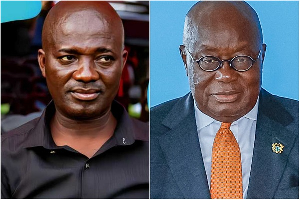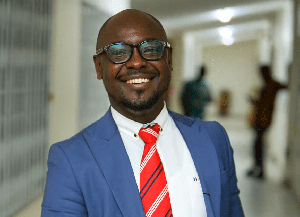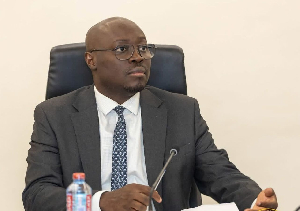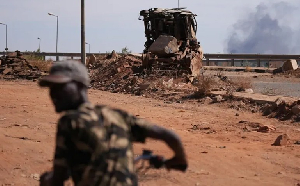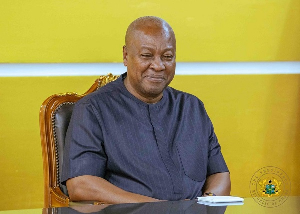BKosmos Energy Apologizes to the Ghanaian government: So what? By SS Quist
In the last few weeks, I have noticed an upsurge in Ghanaian news reports about the discussions between the Ghanaian government and Kosmos Energy. About a week ago, the Ghanaian media reported that Kosmos had apologized to the Ghanaian government. The reason for the apology is unclear as neither Kosmos nor the Ghanaian government has disclosed why or for what Kosmos apologized. While it would be useful to know what Kosmos apologized for, I believe a more important inquiry is: what are the government’s plans for the revenue generated from the oil?
Speaking at a forum on 25 March 2010 in Takoradi, Mr Emmanuel Armah-Kofi Buah, Deputy Minister of Energy, said there would be transparency in the management of oil revenue. While transparency is a must, I would suggest that the Ghanaian public see something tangible in addition to transparency. That “something” is a framework wherein oil revenues go towards: (1) socio-economic infrastructure across the nation and (2) an investment fund that will generate much-needed capital for Ghana, a portion of which would be distributed directly into the hands of the people of Ghana. I will assume that the government does not need a lecture on what socio-economic infrastructure is needed in Ghana. It should be evident by now. As such, the focus of this opinion piece will be on the second point and why those are essential steps for Ghana.
In recent times, Ghana has been lauded as the beacon of democracy and economic achievement in Africa. According to various sources, Ghana has twice the per capita income of the poorer countries in West Africa. Even so, Ghana remains unacceptably dependent on international assistance, investment, remittances by the Ghanaian Diaspora, and unfavourable trade terms set forth by developed countries. Significantly, about 28% of the population live below the international poverty line of US$1.25 a day, most of which are Ghanaian women in the northern region of Ghana. According to the World Bank, Ghana's per capita income has barely doubled in the last 45 years.
By way of background information, in 2007, significant oil deposits were discovered off the coast of southwestern Ghana. The first discovery was made by British-based oil explorer Tullow Oil PLC in the Deepwater Tano block. A second discovery has been made in the West Cape Three Points license area. Jubilee Field is made up of the Deepwater Tano and West Cape Three Points license areas. Tullow owns a 50% stake of the Deepwater Tano license and also holds a 23% stake in the West Cape Three Points license area. Kosmos has a stake of almost 31% in one license area and 18% in the other, giving it about a 30% stake in the entire Jubilee venture. Other partners are Houston-based Anadarko Petroleum Corporation as well as the Ghana government operating through the Ghana National Petroleum Company “(GNPC”). According to reports, GNPC only has a 13.8% stake in Jubilee.
With more than 1.8 billion barrels of light crude oil, Jubilee is reported to be one of the largest oil discoveries in recent years and has the kind of crude oil that is most demanded by global markets. Today, crude oil is selling at over US$80.00 per barrel. Assuming the price of crude oil remains the same, Jubilee could potentially earn over US$140 billion before its stocks are depleted. It is no wonder the foreign oil companies are salivating at the prospect of getting their hands on Ghana’s oil. Oil exploration is ongoing and Jubilee’s oil stocks are expected to increase. What does all this mean for Ghana? How much of the oil revenue will Ghana actually see? I will let you the readers draw your own conclusions.
In October 2009, ExxonMobil and Kosmos entered a deal in which Exxon agreed to buy Kosmos’ stake in the Jubilee oil field for US$4 billion. This deal is reported to have been blocked by the Ghanaian government who is investigating alleged corruption by Kosmos. Interestingly, a U.S. newspaper, the Washington Times, reported last week that the Ghanaian government and Kosmos are “bitterly fighting over who ultimately will control [Jubilee] field”. Already, the Ghanaian government is being vilified for attempting to protect the interests of Ghanaians. Washington Times claims that President Atta-Mills’ government “has targeted foreign companies that invested heavily in Ghana under the prior administration” and that “Ghana's recent actions toward foreign investors is ‘very worrisome’”. The Times describes “the Kosmos case as ‘the most egregious,’ but not the only one.” Mind you, there is nothing being reported about Kosmos’ apology to the Ghanaian government. It is an interesting and telling turn of events. Barely a year ago, the western media highly praised Ghana as a rising star for our peaceful, albeit hotly contested, democratic elections in December 2008. The pro-Ghana fever was further heightened when U.S. President Barack Obama visited the country in July 2009.
By the way, the Washington Times was founded to “combat communism” and is known for its conservative right-wing position on social and political issues. There have been claims that it is one of the media mouthpieces of the Republican Party with constant distortions of the truth to satisfy its right-wing agenda. That should tell you something. Regardless of these reports and attempts to prejudice the American public against Ghana, I encourage the Mills Administration to continue to fight to protect Ghana’s interests in this case. Moreover, and returning to the issue at hand, the government should also consider ways in which any oil revenue can benefit Ghana for years to come. Vincent McNabb said “hope is some extraordinary spiritual grace that God gives us to control our fears, not to oust them.” The experiences of Nigeria and other African nations such as Sierra Leone should remind us that as a people we can continue to hope for economic growth but we should not blindly assume that all shall be well.
Take Nigeria, for example. It is the world’s 12th largest producer of petroleum and the 8th largest exporter. It has the 10th largest proven oil reserves and classified as the second largest economy in Africa. Oil makes up 40% of Nigeria’s earnings. One would expect that Nigeria would have a low poverty rating. On the contrary, and according to Rural Poverty Portal, “despite Nigeria’s plentiful agricultural resources and oil wealth, poverty is widespread in the country and has increased since the late 1990s. Over 70 per cent of Nigerians are now classified as poor, and 35 per cent of them live in absolute poverty.” Going back to my earlier point, more than hope is needed to make sure that Ghana does not end up in the same boat as Nigeria.
Ghana needs to take all the necessary precautions and ensure that the proper and essential structures are in place to see this dream of a developed Ghanaian economy come to fruition. This means not having corrupt government officials and politicians who want to put what is rightfully owned by the people of Ghana into their own coffers. It means having a government with enough of a sense of responsibility to develop mechanisms that will ensure that the proceeds (or at least a portion thereof) from the oil would go back to the people – not government officials, the people of Ghana. More than that, it means the people of Ghana should not sit idly by and watch as their birth rights are sold to the highest foreign bidder or squandered by corrupt government officials. We need to call our government to task and hold them accountable for use of our oil revenue. We need to DEMAND that we do, in fact, see part of the proceeds from the oil revenues. By all means, the revenue should go back into socio-economic infrastructure and public services such as roads, hospitals, schools, technology, etc. However, I would proffer that Ghana’s oil revenue needs to be managed in such a way that proceeds are assured for hundreds of years to come. Specifically, a large percentage of the oil revenue should go into an investment fund that will generate additional revenues, e.g. through earned interest or investment profits. In addition, some of the cash proceeds should also go directly into the hands of long-suffering hard-working Ghanaians.
While researching this piece, I discovered that Norway and the U.S. state of Alaska had implemented a structure akin to the mechanism I am calling for. Norway is the seventh largest oil exporter and third largest gas exporter in the world even though it is not a member of the Organization of the Petroleum Exporting Countries (OPEC). In 1995, the Norwegian government established a wealth fund known as the “Government Pension Fund – Global”. The Pension Fund is funded by oil revenues and includes taxes, dividends, sales revenues, and licensing fees. The Norwegian government controls its oil revenue through a combination of stakes in major operators in the oil fields. It has about 62% ownership in Statoil and runs the fully state-owned Petoro; Petoro has twice the market value of Statoil.
Also, the Norwegian government controls exploration licensing and production of fields. The Fund invests in developed financial markets outside the country. Currently, their budgetary rule is to spend no more than 4% of the fund each year, which is assumed to be the normal yield from the fund. Norway’s approach to its oil revenues has garnered significant financial benefits for the country as a whole. By January 2006, Norway’s Pension Fund controlled assets valued at US$200 billion. By June 2007, the Fund became the largest fund in Europe, with assets of about US$300 billion (equivalent to over US$62,000 per capita). The Fund’s savings equal the Norwegian GDP and by April 2007 was the largest capital reserve per capita of any nation.
Projections suggest that the Norwegian Pension Fund will soon become the largest capital fund in the world. Currently it is the second-largest state-owned sovereign wealth fund after the Abu Dhabi Investment Authority. Conservative estimates suggest that the Pension Fund may reach US$800–900 billion by 2017. As of November 2009, the size of the Pension Fund was approximately US$455 billion and has control over approximately 1.25% of all listed shares in Europe and more than 1% of the publicly traded shares in the world. The Norwegian Central Bank has investment offices in London, New York, and Shanghai. New government guidelines (implemented in 2007) allow the Pension Fund to invest up to 60% of its capital in shares while the remaining 40% may be placed in bonds and real-estate.
Similarly, Alaska’s state government established the Alaska Permanent Fund in 1976 to manage a surplus in state petroleum revenues from the Trans-Alaska Pipeline System. Since its initial principal sum of US$734,000, the fund has grown to US$40 billion as a result of oil royalties and capital investment programs. Every year, the state legislature takes out 8% from the earnings, puts 3% back into the principal for inflation proofing and the remaining 5% are distributed to all qualifying Alaskans. Since 1982, dividends from the Fund’s annual growth have been paid to eligible Alaskans. The portion of the dividends received by Alaskans range from US$331.29 in 1984 to US$3,269.00 in 2008 and included a one-time US$1200 “Resource Rebate”. I wonder if the Washington Times would argue against having the Alaska Permanent Fund. Ironically, Alaska has historically been a republican-leaning state yet they have deemed it necessary to protect the rights of Alaskans just as the Ghanaian government is working to protect the rights of Ghanaians.
In any event, some might argue that administration of the fund disbursement scheme that I am calling for will be too much of a challenge for the Ghanaian government. In response, I would suggest that Ghana’s National Identification System (NIS) is the perfect starting point. NIS was established to help the government’s national development planning. One of the goals of NIS is to boost the delivery of social services such as health, retirement benefits, social administration, and credit facilities by providing population census data. So, for instance, NIS could be used to facilitate payment tracking systems by providing the government with data on those qualified to receive the Fund’s proceeds. Depending on advancements offered by financial institutions, payments can then be made to the qualified individuals via check, direct deposit, or electronic fund transfers. Also, payment centres can be established for individuals who may not have bank accounts. Obviously, internal control mechanisms need to be built in to avoid fraudulent activity, embezzlement, mismanagement and misappropriation of funds, double payment, and the like. In sum, there is no doubt that we will encounter some challenges in designing and implementing a Fund similar to that of Norway and Alaska. However, creative thinking and in-depth analysis will help us find solutions to any problem.
The challenges notwithstanding, proper management of our oil revenues will have countless long term benefits for Ghana just as it has had, and continues to have, for Norway and Alaska. If a portion of Ghana’s oil revenue is placed in an interest-bearing account or in some form of capital investment program as has been set up in Norway, dividends inured can be used to build and maintain important infrastructure. Like the Alaska Fund, I would encourage the government to disburse a portion of the dividends to Ghanaians. 28% of our population live on about a dollar a day. This means that with a population of 24 million, 6.72 million Ghanaians live in the most abject poverty earning US$456.25 a year. This statistic does not even include the additional millions of Ghanaians who may be teetering just above the poverty line. Imagine how much life would improve for these Ghanaians if they were assured an additional US$300? How much more if they got an additional US$3,000 a year? Not to mention the fact that this money will be pumped back into the economy generating businesses, jobs, etc.
Interestingly, last year, Norway sent a government delegation to Ghana to advise the Ghanaian government of how to deal with its oil resources. The offer came after Kofi Annan, fearful that Ghana could succumb to the “oil curse”, asked the Norwegian government to share its experiences with the Ghanaian government. There are claims that Ghana could develop a fund for its oil revenues similar to Norway's Pension Fund. However, I have not seen any reports in the news expounding on the government’s plans to set up such a fund and would ask that, to the extent those claims are true, those plans be made public. The Ghanaian public has a right to know what plans are in the works for Ghana’s oil resources. Furthermore, I urge the government to seriously consider examples of both the Norwegian Pension Fund and Alaska Permanent Fund. (Emphasis added). In my humble opinion, a hybrid of the two mechanisms could be very beneficial to Ghana and its citizens.
In closing, I would like to say that Ghana’s oil is a gift from God that we could continue to benefit from for an eternity, but it MUST be managed properly. The responsibility of how the proceeds from this bounty are managed does not fall solely on the shoulders of the government. It is the collective responsibility of both government and the people of Ghana to ensure that this valuable resource is managed properly. As such, I call on the people of Ghana not to be silent or ignore this very important issue. We, the people, must hold the government accountable. We must demand that the government tell us what plans they have for managing the oil revenues. We must insist on long-term plans that will benefit our children, our children’s children, to wit, our future generations. We must require a management scheme that has built-in checks and balances. There must be accountability and transparency and above all neutrality and fairness in the management and disbursement of the oil proceeds. There must be swift action against ANY individual who attempts to misappropriate the funds. There must be zero tolerance for corruption by government officials and anyone appointed to manage the oil revenue. The time for action is now, not when the oil starts to flow and the dollar signs begin to distract us and the government from doing what needs to be done. We have been blessed with a beautiful gift. We all must make sure it is not squandered.
Credit: SS Quist The author is in-house counsel for an international non-profit organization. This piece represents the author’s opinions and not that of the author’s employer or anyone associated with the author.
Opinions of Thursday, 1 April 2010
Columnist: Quist, S. S.
Kosmos Energy Apologizes to the Ghanaian government: So what?
Entertainment



